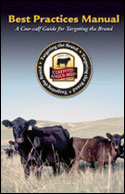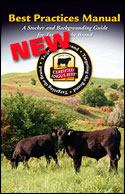An Anaplasmosis Vaccine
Louisiana company produces a unique cattle vaccine to prevent anaplasmosis.
A product manufactured and marketed by a Louisiana company is the only killed vaccine available to prevent anaplasmosis, a disease that costs U.S. cattle and dairy producers an estimated $300 million a year.
Developed by scientists in the LSU AgCenter, the vaccine is marketed by University Products LLC, says Gene Luther. Luther, who is a veterinarian and AgCenter professor emeritus, developed the product along with other AgCenter scientists Lewis Hart and William Todd.
Anaplasmosis, a disease caused by an intracellular microorganism, destroys red blood cells. Clinical signs include severe and profound anemia, and the mortality rate escalates as animals become older and have a higher need for oxygen, Luther says. The greatest problems are with pregnant and nursing cows.
Spread by ticks and horseflies, anaplasmosis occurs primarily in warm tropical and subtropical areas. Ticks are a biological vector because they actually carry the organism, whereas horseflies are mechanical vectors because they can move the organism from one animal to another, although they don't carry the disease themselves.
Once confined to the Gulf and West coasts, it has spread to other parts of the country, Luther says. "It has steadily moved north."
After an animal survives a natural case of anaplasmosis, its immune system will protect against the organism for the life of the animal. Cattle that recover from anaplasmosis, however, are carriers that can spread the disease to susceptible cows.
Vaccine availability
The anaplasmosis vaccine is the only killed vaccine available in the United States, Luther says. The U.S. Department of Agriculture (USDA) allows its sale as an experimental product that can be sold only to licensed veterinarians.
After the researchers developed the vaccine, it was licensed by the LSU AgCenter to Pitman-Moore, which began the process of getting USDA approval to market the vaccine. During the USDA licensing process, Pitman-Moore was acquired by Mallinckrodt, which finished the USDA process and began marketing the vaccine as Plazvax.
A few years later, Mallinckrodt was bought by Schering-Plough, which elected not to produce and market Plazvax. No commercially available vaccine for anaplasmosis was then available.
After Schering-Plough took the vaccine off the market, Luther says, a large dairy in Florida petitioned the USDA to be able to use the vaccine, and the product was granted experimental status. The USDA is the regulatory agency for veterinary biological products.
The vaccine can only be sold as "experimental" because a USDA license requires that it be manufactured in a USDA-approved facility. There is none in Louisiana, Luther says, although he hopes to develop one. The product currently is produced in a laboratory in Baton Rouge.

Although considered experimental, the vaccine is approved by the USDA for sale in 15 states and Puerto Rico, Luther explains. University Products produces the vaccine using the same procedures as the vaccine that had been sold by Mallinckrodt.
"The vaccine offers good protection in areas where it has been used," Luther says. "We have marketed hundreds of thousands of doses, and it is available from your local veterinarian."
Editor's Note: This article is adapted from a news release provided by the LSU AgCenter.
[Click here to go to the top of the page.]





